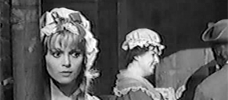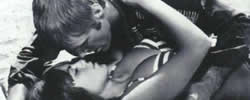Reviews
Reviews Bosomania!: The Sex, the Violence, and the Vocabulary of Russ Meyer

Finders Keepers, Lovers Weepers!
Russ Meyer
USA, 1968
Credits
Review by Katherine Follett
Posted on 03 September 2008
Source RM Films International VHS
Categories Bosomania!: The Sex, the Violence, and the Vocabulary of Russ Meyer
There’s a curious back-and-forth (or would that be up-and-down?) between Russ Meyer and a feminist viewpoint. Some feminist opinions declare anything that offers up the female physique for male enjoyment is exploitive. Meyer’s fans might argue that appreciating women’s bodies is complimentary, and in no way undermines appreciation for their talent or intellect. Other feminists claim Meyer’s brand of female-dominant sexuality is a welcome change from the passive, underwritten damsels-in-distress of most films of similar style. Still others point out that female empowerment can’t count if it arrives by the hand of a man who gets turned on by it.
I tend to find these arguments relatively meaningless and completely boring. Meyer was clearly a filmmaker who made the films he wanted to make, and cared much less about what the audience - whether it was other men, feminists, or society at large - thought than he did about satisfying himself. And what satisfied Meyer is busty women busting out of peril and then busting heads. I was prepared to sit back and enjoy this kind of romp when I cranked up the only VCR in my circle of acquaintance and loaded Finders Keepers, Lovers Weepers! “Does this movie have boobs?” I asked hopefully. The answer from the opening credits was, “Yes, lots!” But as the film took some unexpectedly violent turns, I had to wonder about Meyer’s opinion of what went on.
Paul, one of the protagonists, is kind of a jerk. He owns a gentleman’s club, the setting of the title-sequence titties, and he rakes in the dough off the frustration of other men. Afterward, he heads over to a brothel to try out some new wares. The madam at this brothel is a Meyer classic; purring, slinky, totally in control of the situation at all times. What Paul doesn’t know is that the madam is in cahoots with a pair of robbers camped out at the strip club, and has plans to get him drunk to the point of incapacitation so the robbers can do their work without interruption. The madam does as asked and drops Paul off at home, where things start to get tricky.
Paul’s wife Kelly is a fragile-looking woman, for a Meyer film. She is wide-eyed and has a bone-china complexion, a bit like Marilyn-Manson era Rose McGowan or pre weight-loss Christina Ricci. She bemoans Paul’s behavior in a defeated, exhausted tone that’s hard not to sympathize with. (Apparently, this isn’t the first time her husband has been left on her doorstep staggering and reeking of hooker love.) After arguing for a bit, Paul grows angry. He slaps her around and then forces himself on her, in a way that lets us know that everyone at this time - the director, the characters, the intended audience - believed that a man couldn’t “rape” his wife, legally or actually. While the scene isn’t played for much of a turn-on, its erotic aspects have not been entirely downplayed. Kelly protests, but doesn’t actually resist. The husband barely notices.
As Paul goes for a shower, Kelly gets a call from the bartender at the club. Apparently, the title-sequence-titty girl got sick of things and walked off the job, and now there’s no one to fill the stage. After some hesitation, Kelly agrees to spite her husband by stripping for other men. As Kelly strips with wild enthusiasm, her dance is intercut with flashbacks from the scene with Paul, and her face in the flashbacks records a notably more ambiguous, maybe even pleasurable, reaction than I remember from the scene itself. Kelly feels shamed after dancing, and allows the bartender to comfort, then seduce her. He brings her to his house where they enjoy classic Meyer sex - intercut with footage of a demolition derby - in the hot tub.
Meanwhile, Paul sobers up and interrupts the robbery in progress, only to be hog-tied. Kelly and the bartender stumble on this scene, and the robbers quickly use the new hostages as collateral, dispatching the bartender and threatening to rape Kelly unless Paul tells them the safe combination. Paul refuses. Then, the threat becomes action. This time, there is no ambiguity; Kelly screams and fights back, her voice shrieking over the near-constant saxophone score while Paul watches with horror. Partway through the act, he finally relents, offering up the safe number.
The obvious question is this: Why didn’t Paul give them the safe combination as soon as it became apparent that the threats were serious? Or even before then, when the robbers had already proven willing to kill someone? The rape scene feels unnecessary, because Paul’s refusal to stop it is so obviously (or maybe just hopefully) unrealistic. Is a few hundred dollars worth your wife getting raped? Surely not. Is your suspension of disbelief worth getting another titty shot? Apparently, if that’s why the scene is here. All the boring feminists critiques have much more at stake when it’s no longer sex, but a sex crime. Is Meyer turned on by rape? Are we supposed to be turned on? Should we all keep in mind that this is just a movie, or should we empathize with the characters? Is the rape included because of its violent nature, or despite of it? Few would argue that Meyer shows the mistreatment of women purely to enjoy their suffering—and here, there is empathy in his depiction of Kelly. Perhaps Meyer didn’t intend anything; there is a rape in the movie because that’s the way the plot went, and rape is more exciting than almost-rape. But whether he wanted to or not, Meyer opened a door onto some relatively ugly issues, issues I’m not sure this film has the intention or the capacity to solve.
At the end, I think the film, and by extension, the filmmaker and the audience, does sympathize with Kelly. Initially, the film revels in her newfound sensual freedom when she strips despite the will of her husband and allows herself to be seduced by the bartender. She is released from sexual servitude and allowed to come into her own, but is then brutally victimized. We don’t enjoy her victimization. But while this plot arc makes a powerful comment on the hypocritical sexual morality of 20th-century America, it feels startling and somewhat disturbing coming from Meyer. Meyer is not Lars von Trier; most of the film is shot in his standard archly humorous and goggle-eyed stag style. Because of this, we’re never sure if we feel for the victim or get turned on with the perpetrators. Meyer’s ability to make a serious comment on issues of sex and violence is limited by his budget and intended audience, even if the filmmaker was keenly aware of those issues.
So, were there boobs in this movie? Yes and yes. Was it an entertaining romp, the kind one expects when watching seeing a Russ Meyer film? Well, no, not really. It brings up awkward issues that feel both more visceral and more academic than one would hope. There is an unexpected ambiguity in Kelly’s vacillation from shame to empowerment and back again, especially from a man who seemed to enjoy nothing more than watching women turn the tables on men, seize sexual power, and give the bad guys their comeuppance. The filmmaker’s intentions remain unclear, and while this gives the mind something to chew on, it comes at the expense of some of Meyer’s beloved sense of fun.
More Bosomania!: The Sex, the Violence, and the Vocabulary of Russ Meyer
-

The Immoral Mr. Teas / Eve and the Handyman
1959 / 1961 -

Lorna
1964 -

Fanny Hill
1964 -

Mudhoney
1965 -

Faster, Pussycat! Kill! Kill!
1965 -

Motor Psycho
1965 -

Mondo Topless
1966 -

Common-Law Cabin
1967 -

Good Morning and… Goodbye!
1967 -

Finders Keepers, Lovers Weepers!
1968 -

Vixen!
1968 -

Cherry, Harry & Raquel!
1970 -

Beyond the Valley of the Dolls
1970 -

The Seven Minutes
1971 -

Black Snake
1973 -

Supervixens!
1975 -

Up!
1976 -

Beneath the Valley of the Ultravixens
1979
We don’t do comments anymore, but you may contact us here or find us on Twitter or Facebook.


